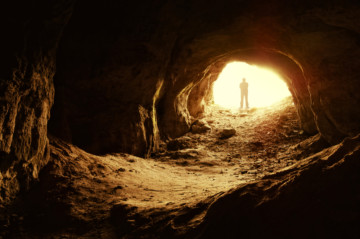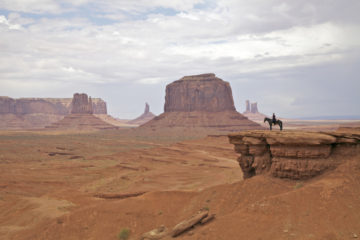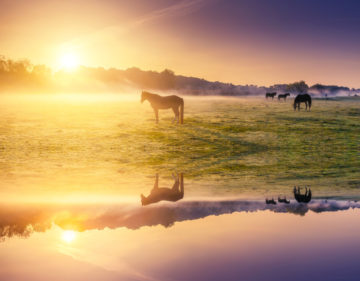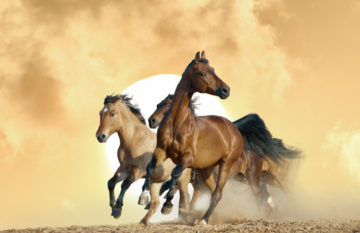
Did you know that increasing scientific evidence suggests certain animals reached out to our ancestors—befriending, empowering, and gentling people long before we were able to corral and control them? Did you realize that as early humans formed partnerships with animals, our own species became braver, stronger, and more compassionate as a result?
Join bestselling author Linda Kohanov for a moving, at times mind-altering exploration of humanity’s deep connection with the caring side of nature when she presents The Heart of Evolution: Exploring the Hidden History and Untapped Potential of the Human-Animal Bond Saturday, April 8, from 1 to 5 pm at the Doubletree by Hilton Reid Park in Tucson, AZ. A daylong skill-building workshop on how to take this ancient wisdom back to the modern human world will follow on Sunday. The public can attend either or both events.
“In researching my fourth book The Power of the Herd, I came across some unexpected information that turns conventional theories about animal domestication inside out and upside down,” Kohanov marvels. “I quickly realized that this counterintuitive perspective on how ancient humans formed mutually beneficial partnerships with other species offers a model for how we can effectively gain the trust and loyalty of people who we may initially perceive as being very different from ourselves.”
In her latest book The Five Roles of a Master Herder, Kohanov was able to distill research on the human-animal bond into a remarkable eight-step process for 21st century humans who want to enhance their relationships with other people in business, community, educational, and family settings, as well as with other cultures. She will present this eight step process, and the history and science behind it, during The Heart of Evolution half day seminar.
“Linda’s books come alive in this visually inspiring and intellectually original culmination of her work,” says Beverly Kane, MD, Stanford School of Medicine, who attended the seminar when Linda offered it near San Francisco last month. “She is once again the brilliant voice of associative thinking, using science, spirit, and stories to dig deep into our history and into our hearts. What evolves is a striking new narrative on our non-predatory co-evolution with multiple species of animals.”
Actor William Shatner, who attended both The Heart of Evolution half day seminar and The Five Roles of a Master Herder skill building workshop in Los Angeles last summer, characterizes Kohanov’s latest work as “an innovative and practical nature-based approach to leadership, and life. [It’s] not just for corporate executives. Parents, teachers, community organizers, film directors, and especially politicians would all benefit from these skills.”
 Angie Wilson, staff member at Equine Voices horse rescue, attended the Heart of Evolution seminar Linda offered in Amado, AZ earlier this month. “A shift needs to occur toward a more compassionate view of all life and our planet,” Angie emphasizes. “Linda’s research is extensive, and she provides evidence as to why we need this shift.”
Angie Wilson, staff member at Equine Voices horse rescue, attended the Heart of Evolution seminar Linda offered in Amado, AZ earlier this month. “A shift needs to occur toward a more compassionate view of all life and our planet,” Angie emphasizes. “Linda’s research is extensive, and she provides evidence as to why we need this shift.”
“The eight-step process I feature in The Heart of Evolution seminar uncovers nature-based wisdom for how we can make this shift,” Linda adds: “wisdom that was lost when people became increasingly citified and, consequently, disconnected from nature and animals. The Five Roles of a Master Herder workshop the following day builds on this wisdom, offering specific tools and skills that allow you to navigate human group dynamics and positively affect others at work, home, school, and in larger social, cultural and political contexts—whether you are the ‘official’ leader or not. ”
To register for one or both events: The Heart of Evolution and/or The Five Roles of a Master Herder.
Special Guests in Tucson
After leading The Heart of Evolution and Five Roles seminars across the US, Canada, and Europe over the last four years, Linda was pleased to find an open weekend to offer these seminars in her ‘hometown’ of Tucson April 8 and 9. “The Tucson events also offer me the opportunity to bring in some special guests,” she says. “Ann Baldwin PhD, a physiology professor at the University of Arizona, has become one of the major scientific researchers in studying the effects that horse-facilitated activities have on humans. She will be sharing some very exciting, pre-publication information on studies she has just completed. This research shows statistically significant effects that specific equine facilitated activities have on heart health, stress reduction, and self-esteem.”
Ann will speak at Linda’s Saturday, April 8 seminar, as will Charlotte Richardson, a Tucson-based educator who is a pioneer in bringing horse-inspired wisdom to the public school system.
 “A teacher with 20 years experience, Charlotte decided to attend the Eponaquest Apprenticeship Program to expand her educational tool box with horse-facilitated work, thinking that she would leave public education and start her own equine-facilitated learning program,” Linda says. “But it turned out that her school principal was so intrigued by the emotional/social intelligence and leadership skills Charlotte learned through this program that he asked her to teach the Eponaquest tools and principles at her school, five days a week in the classroom, with monthly trips to the barn. She’s done this for two years now. I’m excited that Charlotte will be able to share more about the format of this class and how students are responding to this combination of classroom work and equine-facilitated sessions.”
“A teacher with 20 years experience, Charlotte decided to attend the Eponaquest Apprenticeship Program to expand her educational tool box with horse-facilitated work, thinking that she would leave public education and start her own equine-facilitated learning program,” Linda says. “But it turned out that her school principal was so intrigued by the emotional/social intelligence and leadership skills Charlotte learned through this program that he asked her to teach the Eponaquest tools and principles at her school, five days a week in the classroom, with monthly trips to the barn. She’s done this for two years now. I’m excited that Charlotte will be able to share more about the format of this class and how students are responding to this combination of classroom work and equine-facilitated sessions.”
Merlin’s Spirit
Proceeds from the April 8 Heart of Evolution seminar, in fact, will go to support a new program that Linda and Charlotte are creating for teens and their parents. “In watching the school program unfold, Charlotte and I realized that one of the biggest challenges in establishing such a class was that students were going home with sophisticated tools their parents didn’t have,” Linda reports. “It’s extremely difficult for a child of practically any age (even as an adult) to teach his or her own parents how to become more balanced, emotionally and socially intelligent parents/leaders. This is why we felt that the next level of working with younger generations had to involve programs where children and their parents learn these skills together. This is the main focus of the Merlin’s Spirit Program for Teens and their Parents.”
Named after her stallion Merlin and his son Spirit, the program offers an efficient and engaging way for families to practice social intelligence, leadership, conflict-resolution, anti-bullying, and relationship skills through safe, and fun, ground activities with horses. The curriculum is designed to teach leaders of the future how to excel at home, school, work, and life. For more information about the Merlin’s Spirit Program, see http://eponaquest.com/merlin-spirit-program-teens-parents/.
Ancient Wisdom for Modern Families
“Charlotte and I were both astonished that the middle school students were particularly captivated by the Five Roles of a Master Herder model,” Linda says. “I’ve also found that counselors and social workers have embraced the model for helping people navigate difficult family dynamics.”
At the Sunday April 9 daylong skill-building workshop, The Five Roles of a Master Herder, Linda will debut a new workbook specifically on how to use the five roles in parenting and family systems contexts.
“While The Five Roles of a Master Herder was written on the topic of socially intelligent leadership, it’s not just a business book,” Linda emphasizes. “Parents are leaders, as are teachers, social activists, counselors and others who may be charged with helping families in transition or crisis. For this reason, I was pleased to accept an invitation to teach the Five Roles model to staff members from the JAYC Foundation and Transitioning Families, Inc. in February.
“The JAYC Foundation was started by Jaycee Dugard, the courageous woman who was kidnapped and held in Northern California by her captors for 18 years. Her counselor, Dr. Rebecca Bailey, used animal-assisted therapy in helping the family heal after they were reunited. Over the years, I’ve had the pleasure of collaborating with Rebecca, Jaycee, and their wonderful staff on how to adapt many of the tools I introduced in my books The Power of the Herd and The Five Roles of a Master Herder for their work with families. Key staff members from Transitioning Families and the JAYC Foundation have now become Master Herder Instructors and are offering workshops that combine this model with their own innovative techniques for assisting families, law enforcement, judges, and other professionals who deal with domestic violence, high conflict divorce, kidnapping cases and other challenges.”
During the February training, Linda and the JAYC Foundation/Transitioning Families team created a workbook that translates the Five Roles into a tool that people can use to become more balanced and effective parents. “The leadership clients I’ve shared this workbook with have already embraced this additional tool for using the Five Roles at home,” Linda says. “After all, as we know, many successful executives, activists, artists, inventors, and managers have as much or more difficulty managing their personal relationships with spouses, children, and other family members as they do in handling work relationships. I’m pleased to be able to publically debut the workbook Ancient Wisdom for Modern Families at my upcoming workshop in Tucson. I’m also excited that all proceeds from the sale of this workbook go to the JAYC Foundation to support the important work they are doing for families in crisis and transition, as well as the trainings they offer to law enforcement.”
An excerpt from this workbook is featured at the end of this newsletter.
East Coast Appearances
Those who live on the East Coast will have two opportunities to attend similar workshops when Linda travels to Connecticut and North Carolina in May.
“I can’t bring my Tucson guests with me,” Linda says, “but I will be covering all the material and tools presented in The Heart of Evolution and The Five Roles seminars—and more—during a weekend workshop at the beautiful Rowe Center.” For more information on the May 19 to 21 workshop at the Rowe, Massachusetts retreat and conference center, http://eponaquest.com/workshop/horse-sense-balance-power-lead-change-unpredictable-world/.
Linda will also be offering the same one-day workshop on The Five Roles of a Master Herder that she’s doing in Tucson during a trip to Raleigh, North Carolina. For information and registration http://eponaquest.com/workshop/5-roles-master-herder-revolutionary-model-socially-intelligent-leadership/.
These are the only two workshops she will be doing on the East Coast in 2017.
An Excerpt from Ancient Wisdom for Modern Families
“People often ask me why I decided to the call subject of my latest book a ‘master herder,’ rather than ‘a masterful leader,’ or some other such term,” Linda says. “It has to do with the fact that such a person is so much more than leader.” The following excerpt from the Ancient Wisdom for Modern Families workbook explains why:
This model is based on five styles of power/social influence active in groups of humans and animals that can either work at odds with each other, or enhance the wellbeing of the entire “herd” or “tribe.” Most people prefer to use one or two roles, and ignore or even abdicate the others. The tendency to overspecialize, however, gives rise to unproductive behaviors. But as author and Eponaquest Worldwide founder Linda Kohanov discovered in her studies of power dynamics throughout history and across multiple cultures and species, there is another way.
 “Over thousands of years, nomadic pastoralists — tribes that move with large, unrestrained animals — developed a multi-faceted, socially intelligent form of leadership combining five roles,” she explains. “In understanding the differences between the Dominant, Leader, Nurturer/Companion, Sentinel, and Predator roles, herders were able to capture the unique power of each. In the process, they created a fluid vocabulary of interventions that allowed interspecies communities to move across vast landscapes. These people had to deal with predators and changing climates, protecting and nurturing the herd while keeping these massive, gregarious, sometimes aggressive animals together — without the benefit of fences and with very little reliance on restraints.”
“Over thousands of years, nomadic pastoralists — tribes that move with large, unrestrained animals — developed a multi-faceted, socially intelligent form of leadership combining five roles,” she explains. “In understanding the differences between the Dominant, Leader, Nurturer/Companion, Sentinel, and Predator roles, herders were able to capture the unique power of each. In the process, they created a fluid vocabulary of interventions that allowed interspecies communities to move across vast landscapes. These people had to deal with predators and changing climates, protecting and nurturing the herd while keeping these massive, gregarious, sometimes aggressive animals together — without the benefit of fences and with very little reliance on restraints.”
Linda summarized the research leading to the creation of this model in her 2013 book The Power of the Herd: A Nonpredatory Approach to Social Intelligence, Leadership and Innovation. “It became clear that the interspecies socialization and leadership skills used by nomadic pastoral cultures uplift the intelligence of the entire community, resulting in behavior so coordinated, so sophisticated, it baffles the 21st century mind,” she says. “These richly nuanced skills were lost when humanity moved toward a sedentary, city-based lifestyle. Even so, when applied to modern situations, these ancient principles can help us harness the talents and creativity of entire families and communities.”
With this goal in mind, Linda created the term “master herder” to describe a strong, compassionate, well-balanced leader who also acts as a caretaker and guardian. Such a person has to master five roles of power and social influence, using them fluidly, interchangeably, as needed.
The Five Roles of a Master Herder model necessitated the writing of a book specifically on how to adapt this ancient wisdom to the modern human world for business, educational, nonprofit, family, social service and community settings. Over the last four years, Linda has also worked with Dr. Rebecca Bailey and other members of the JAYC Foundation and Transitioning Families to adapt it specifically to the needs of families in conflict and transition.
The Five Roles of a Master Herder offers a powerful yet relatively simple template for helping people understand instinctual behaviors that surface in groups of social animals, including humans. More importantly, it offers alternative explanations for behaviors that occur in families and communities. Learning how to use all five roles effectively can help systems adapt to rapid change, allowing groups of people to face unexpected challenges together—and capitalize on unexpected opportunities. The Five Roles of a Master Herder (2016) book offers extensive information on the rich history and science behind this model, as well as how to develop and balance each of the roles.
The JAYC Foundation and Transitioning Families personnel have found this model to be an effective and engaging way to help families and individuals recognize unproductive patterns. Many of the productive as well as the unproductive behaviors listed in this book are also seen in groups of social animals. Realizing that certain behaviors are universal, not personal, gives people a constructive view of conflicts that occur when family members employ natural behaviors in unconscious and unbalanced ways. The JAYC Foundation and Transitioning Families found this approach useful for empowering families and groups from within their existing system. Individuals, groups and families can learn from a perspective that is non-blaming and solution focused. Understanding these roles and how to modify one’s own behavior has provided our programs with a tool for encouraging growth, connection, and leadership that are core components to our work and overarching philosophy.
Most of the unproductive behaviors covered in this book are in fact instinctual, and hence not intentionally malevolent. This perspective alone can help people to avoid shaming and blaming each other. In studying this model under the direction of a trained counselor or educator, people can also learn how to hold family members accountable for hurtful actions while encouraging them to adopt the more productive behaviors inherent in each role. The goal is to help each individual parent become a compassionate, empowered “master herder,” one capable of employing the strengths of all five roles fluidly, as needed. These skills also help parents teach their children how to contain and channel their power for the good of the family and larger social system.
For more information on the JAYC Foundation, see http://thejaycfoundation.org/
For more information on The Five Roles of a Master Herder book, see https://www.amazon.com/Five-Roles-Master-Herder-Revolutionary/dp/1608683389/ref=sr_1_1?ie=UTF8&qid=1490936393&sr=8-1&keywords=5+roles+of+the+master+herder